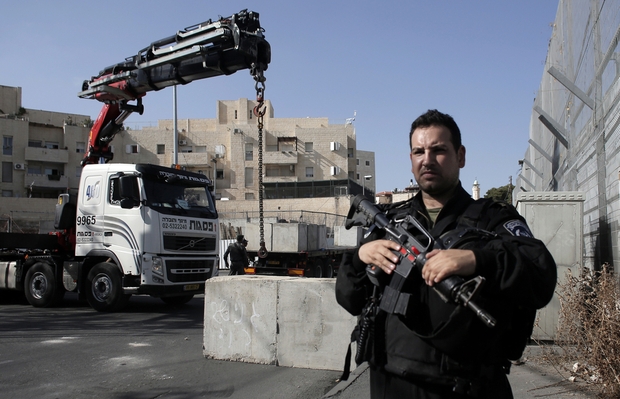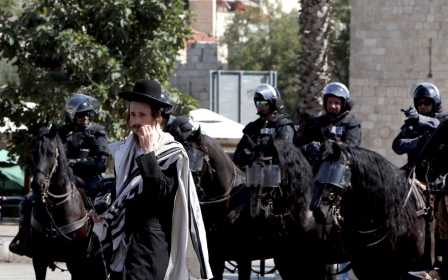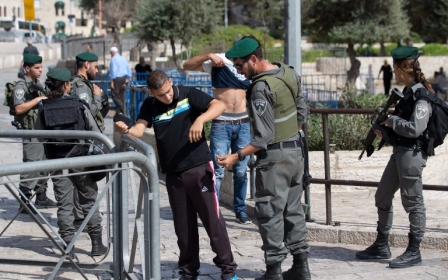The paradox of Jerusalem

In its 48 years of occupation of the Palestinian territories, Israel has not tried to make occupation look more normal and transparent than in East Jerusalem. A week after the 1967 war, it annexed the Palestinian part of the city, together with 28 nearby Palestinian villages, and applied Israeli civilian law, contrary to the martial law still in place throughout the rest of the West Bank.
Israel has built large neighbourhoods in these areas that house some 250,000 Israelis in order to distance Palestinian Jerusalem from its Palestinian hinterland; it has settled thousands of Jewish settlers in the heart of Palestinian neighborhoods, including the sensitive Old City, in proximity of the Al Aqsa mosque; and has built a nine meter concrete wall separating annexed Jerusalem from the rest of the West Bank.
So when the Israeli government decided on Tuesday to enforce closure on Palestinian neighbourhoods in Jerusalem it practically admitted that its huge efforts over the years to "normalise" its occupation of East Jerusalem had proved vane. It is if Israel is reoccupying a territory it has declared its own 48 years ago.
The current burst of violence that started two weeks ago has reached every part of Israel and the Palestinian territories. At least 37 Palestinians and seven Israelis have died since the current burst of violence began in early October all over Israel, the West Bank and Gaza.
But nowhere has this violence been more felt than in Jerusalem. Not only because the reason for the violence given by nearly all Palestinians is Israel's alleged attempt to take over Al Aqsa and their own will to defend the holy place, but also because Jerusalem, Israel's capital and largest city, has become the theatre of intense daily violence.
Five Israelis civilians have been killed and dozens more wounded in attacks by Jerusalemite Palestinians. At least 11 Palestinians died and several dozen were wounded. Israel claims that each Palestinian killed were those attacking civilians or policemen. Palestinians, however, claim that some of them did not pose any threat, a charge supported by some Israeli human rights groups.
Jerusalemite Palestinians carried out some of the stabbing attacks in other parts of Israel, like Tel Aviv or Ra’anana. Adding daily protests and heavy clashes between Palestinians and Israeli security forces in nearly every Palestinian part of the city, it’s clear that Jerusalem has become Israel's top security problem.
Jerusalemite Palestinians also feel a special responsibility for the fate of Al Aqsa mosque, so it is easy to understand why Israel's not-so-alleged attempts to change the status quo on Haram a-Sharif/Temple Mount enrolled them into action. But that is not enough to explain why this new Palestinian uprising is centred in Jerusalem.
Peculiar situation
The Palestinians in Jerusalem live in a very peculiar situation. They carry Israeli identity cards, so they enjoy freedom of movement denied to their fellow Palestinians in the West Bank and Gaza. But contrary to Palestinians living in Israel, they are not Israeli citizens and their temporary residency status could be abolished at any time.
And above all, Jerusalemite Palestinians feel the burden of Israeli discrimination on a daily basis. While they represent 37 percent of the total population in the city, the poverty rate among them has reached 75 percent, a third of their youth drops out before finishing high school and 39 percent of their houses are built without permits. Events on al-Aqsa ignited a longstanding frustration built for many years.
As always, Israel responded to the violent events in Jerusalem by tightening its security control over the Palestinian parts of the city, sending in thousands of extra police forces. It also gave these policemen almost an open hand to shoot to kill any Palestinian involved in attacks. "Any event in which policemen or civilians are hurt must end with the killing of the attacking terrorist," said Moshe (Chico) Edry, the commander of Jerusalem's police.
This policy led to conflicting versions of events that ended with Palestinians shot by police. In most cases, Palestinian witnesses claimed that those shot were not carrying any knife or were shot without posing any threats. Israeli witnesses told an opposite story.
Yet as most of these events were documented by cellphone cameras and quickly distributed on social media, the pictures of Palestinians shot allegedly for no reason only built more anger.
The decision to put Palestinian neighbourhoods in East Jerusalem under closure was an adoption of methods used by the Israeli army in the West Bank during the Second Intifada. But their effectiveness in Jerusalem is very doubtful.
The roadblocks at entrances to the Palestinian neighbourhoods do make life harder for the Palestinians living there. Tens of thousands of Palestinians cannot travel by car or buses to their places of work in the western parts of the city and go through humiliating checks at the crossing points.
Yet this closure cannot be total, as Jeruselamite Palestinians, thanks to their Israeli IDs, are entitled to pass the checkpoints in Jerusalem and Israel. Israel may decide to enforce martial law in the Palestinian parts of Jerusalem, or even abolish their annexation to Israel, as some commentators suggest.
But such a move is almost politically impossible because it’s an official acknowledgement of the failure to create an united city under full and exclusive Israeli domination, a ideological cornerstone among right-wing governments. Prime Minister Benyamin Netanyahu will be the last man ready to be responsible for initiating such a process.
So apart from harassing the Palestinians residents of Jerusalem, it is difficult to see how the "closure" of their neighbourhoods will help prevent further attacks. To make this matter more complicated, Israel itself admits that the perpetrators of these attacks act alone, without any clear affiliation to any Palestinian political fraction or military organisation and without being given orders.
This situation makes the Israeli General Security Service - famous for its success in detecting nearly every Palestinian military organisation in the West Bank and Jerusalem - almost impotent in dealing with this wave of attacks. Israel just hopes that this wave of violence will die out on its own. "We do not know how many (Palestinian) suicide attackers there are, but their number is not unlimited," Netanyahu was quoted saying this week.
Netanyahu in a political bind
Netanyahu is determined not to put the current wave of violence into any political context. In his speech in front of the Israeli parliament early this week, he claimed that Palestinian terrorism “does not come from frustration over the lack of a diplomatic solution, but from a desire to destroy us. That was the motive for terrorism in the early years of Zionism and that’s what it is today.”
Loyal to this line of thinking, Netanyahu requested a delegation of the Quartet (formed by the US, UN, EU and Russia) to cancel a visit scheduled for this week in Jerusalem and Ramallah. Faced with the worst violence Israel has seen in years, Netanyahu clearly chose the option of managing the conflict, not solving it.
Yet his options to "mange the conflict" seem narrower each day. He continues to blame Palestinian President Mahmud Abbas for "incitement" against Israel, but at the same time he calls him again and again to meet with him. After Abbas himself declared in the UN General Assembly two weeks ago that he is ready to dismantle the Palestinian Authority, it left Netanyahu almost without any leverage.
Israel will hate to see the dismantling of the PA. This was further proved this week as its forces helped to scale down the clashes between Palestinian demonstrators and Israeli security forces in the West Bank. Without the PA, Israel may face a Jerusalemite-like situation all over the West Bank.
Even with the Hamas-led government in Gaza, Israel seems relatively restrained. After Israeli soldiers opened fire and killed six Palestinians who demonstrated early this week near the barrier separating the Gaza Strip from Israel, the army later this week allowed Palestinian protesters to cross the barrier, a scene not seen for many in Israel. It is quite clear that Israel does not want an escalation with Gaza while it faces an already deteriorating security situation in Jerusalem and elsewhere.
In a poll conducted last week, Netanyahu ranked third in who can guarantee best Israel's security. Ex-foreign minister Avigdor Lieberman, now leading the opposition to Netanyahu's "softness" towards the Palestinians, was ranked first, and Education Minister Naftaly Bennet, a right- wing opposition from within the government, was ranked second.
For Netanyahu, who laboured hard to position himself as Mr Security, this was probably a hard blow. But trapped between his unwillingness for any political compromise or to stop ultra-Orthodox Jews from going to Al Aqsa mosque, and his inability to stop the current Palestinian uprising, his hands seem rather tied. He just waits and hope for the best.
- Meron Rapoport is an Israeli journalist and writer, winner of the Napoli International Prize for Journalism for a inquiry about the stealing of olive trees from their Palestinian owners. He is ex-head of the News Department in Haaertz, and now an independent journalist.
The views expressed in this article belong to the author and do not necessarily reflect the editorial policy of Middle East Eye.
Photo: An Israeli soldier stands guard as a crane lowers cinder blocks at an entrance to East Jerusalem (AFP)
New MEE newsletter: Jerusalem Dispatch
Sign up to get the latest insights and analysis on Israel-Palestine, alongside Turkey Unpacked and other MEE newsletters
Middle East Eye delivers independent and unrivalled coverage and analysis of the Middle East, North Africa and beyond. To learn more about republishing this content and the associated fees, please fill out this form. More about MEE can be found here.




